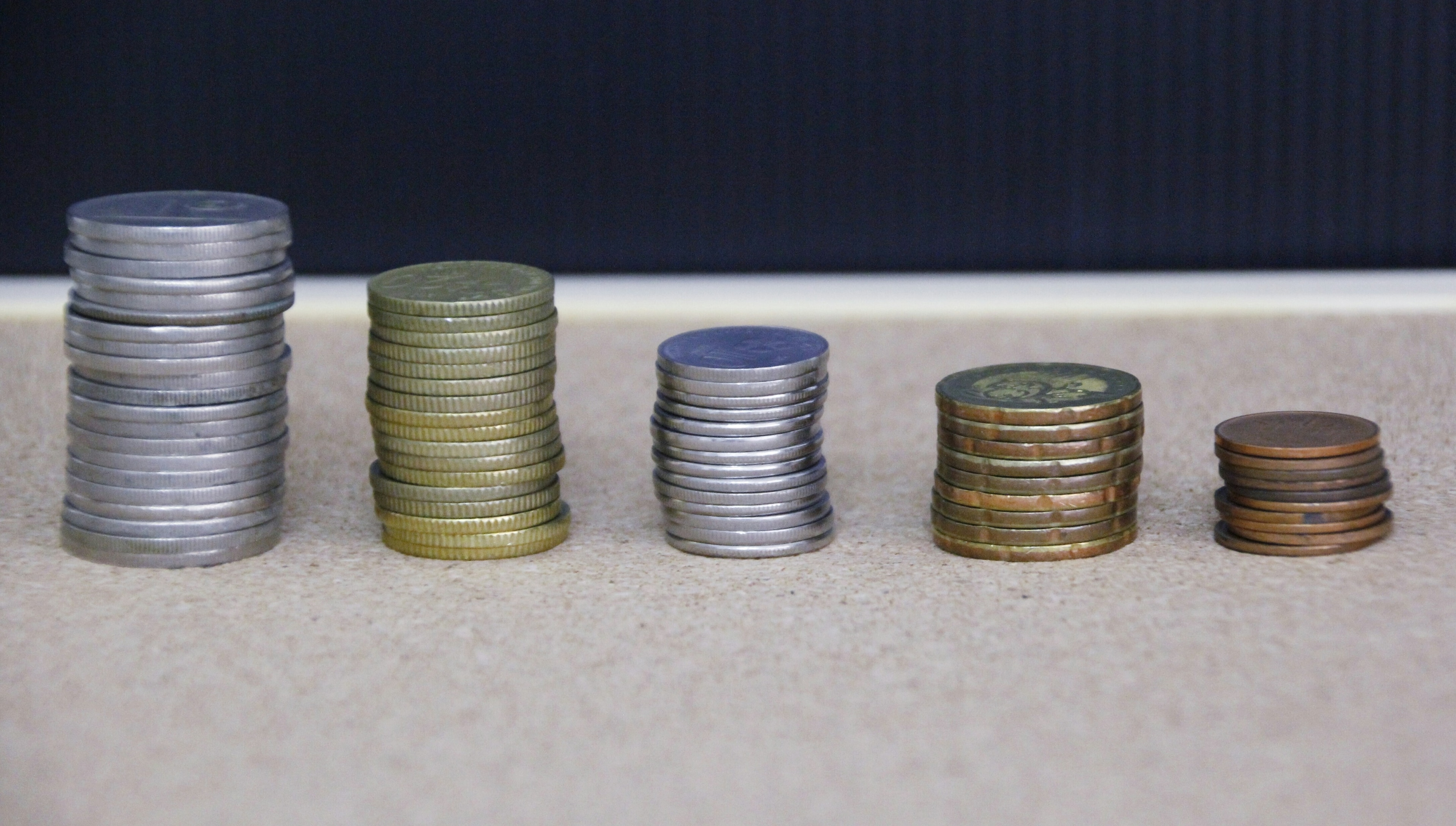These 5 industries can drive digital financial inclusion
![A worker hangs clothes to dry on the roof of a garment factory in the Bangladeshi capital Dhaka on June 15, 2005. Across Bangladesh, hundreds of small clothing factories have closed or slashed jobs following the January expiry of worldwide export quotas allowed under the Multi-Fibre Agreement (MFA), which had regulated the global clothing trade. [Under the MFA, major markets in the United States and Europe guaranteed imports of textiles and garments from poor countries such as Bangladesh and Sri Lanka under a quota system. Picture taken June 15, 2005.] - PBEAHUNZBDB](https://assets.weforum.org/article/image/large_aEtgMDSSLVNZA1uAuU6Ikt1BaylxLIP27CaLRVDmDhk.jpg)
Digitizing payroll, mass transit and supply chains encourages use of digital payments and greater access to financial services Image: REUTERS

Get involved with our crowdsourced digital platform to deliver impact at scale
Stay up to date:
The Digital Economy
What good is a hammer without a nail – or, for that matter, without a piece of wood? A hammer can be a powerful tool, but alone, it’s just a hunk of metal.
Digital payments are no different. Cards and digital wallets are tools; it’s the act of using these tools for making payments that gives them impact. In the past decade, the world has made tremendous progress in expanding access to digital financial services to those at the base of the pyramid, but this has not been enough to achieve meaningful financial health for the millions of underserved. In fact, a quarter of financial accounts opened in developing countries are dormant.
Banks and governments can only do so much. The private sector must be part of the equation – it can be a powerful driver of financial inclusion. Many private sector entities are already encouraging commerce at the base of the pyramid and stand to benefit from a greater use of digital technology – both through the digitization of vital processes as well as the digitalization of business models. Payments can be enable both.
Digitizing payroll, mass transit and supply chains – industrial, agricultural and entrepreneurial – for example, not only provides an opportunity for the underserved to use their cards and digital wallets, it motivates this use by providing convenience and security as well as access to other products, such as savings.
Businesses who touch “the last mile” – the delivery of services to end users – will benefit from partnerships that realize the potential of digital payments through market expansion, including the ability to take advantage of new data on consumer segments to better target products and services. These partnerships will also bring operational efficiencies and streamlined processes. A more inclusive business model additionally enhances a brand’s value in an era where consumers increasingly pay a premium for those truly committed to inclusive business and sustainability.
These last-mile businesses are overlooked opportunities for driving financial inclusion as they already serve millions of individuals, micro-entrepreneurs and small businesses. The story is best told through five industries that touch the last mile:
1. Manufacturing: Digitizing payrolls for garment industry workers has shown great promise in reducing inefficiencies. In Bangladesh, 90% of salaries paid by businesses are still distributed in cash, so leading global brands such as H&M, Marks & Spencer, Target and Li & Fung are collaborating through the HERfinance programme, managed by Business for Social Responsibility (BSR), to digitize the worker payroll of their suppliers.
The programme, part of HERproject and developed in close partnership with the Bill & Melinda Gates Foundation, serves as a unique platform for cross-brand collaboration. Participating factories are supported by their partner brands, BSR and local NGOs who work with digital financial service providers to digitize payroll at Bangladeshi factories and have reached more than 100,000 workers, 60% of whom are women. These factories, in turn, have experienced a 53% saving in staff time for their administrative and finance teams.
2. Mass transit: As rapid urbanization continues around the world, mass transit remains unaffordable for the poorest 20% of the population in many cities in emerging markets. That is a problem for city operations, but also for those at the base of the pyramid as the lack of transportation options constrains their social and economic mobility.
One opportunity for digital payments to make mass transit more efficient is to create an open standards-based solution that can drive seamless interoperability, greater innovation among providers and more agility to meet consumer demands. On 31 May 2019, for example, New York City’s Metropolitan Transit Authority launched a pilot programme to bring “tap and go” payments to its bus and subway systems. Transit agencies could also partner with a financial provider to provide prepaid cards or a mobile wallet for the agency’s unbanked ridership.
3. Fast-moving consumer goods (FMCG): Digital payments throughout a supply chain enable FMCG companies to generate data on their small retailers and consumers. Small retailers are able to make payments more easily to FMCG distributors, reducing the insecurity and inconvenience associated with cash. Meanwhile, FMCG companies can have nearly real-time information on their inventory and improved visibility into demand, ensuring appropriate supply and increased sales for their customers.
The Jaza Duka partnership between Mastercard and Unilever is a great example of this improved dynamic. By digitizing information from suppliers and local distributors, merchants’ purchase history can be analysed to facilitate and improve credit decisions. Combining distribution data from Unilever with Mastercard purchase data, enables banks such as Kenya Commercial Bank to better assess credit worthiness. This allows small retailers to more effectively manage their finances and inventory, avoid stockouts and drive incremental sales.
4. Renewable energy: We are witnessing a revolution in renewable energy access but we will not be able to scale this without digital payments. We see this in the rise of pay-as-you-go (PAYG) business models, which provide millions of previously underserved consumers with access to solar power. Instead of paying the full cost of a home solar system upfront, the PAYG model allows consumers to lease the system by making an initial deposit, followed by small installments at regular intervals until the full value of the system is paid.
The combination of solar technology, the Internet of Things and digital payments can reach millions of new consumers who were previously off grid. One example is Mastercard's partnership with M-KOPA, a PAYG provider in East Africa, to provide an open and interoperable solution that allows customers to make payments through the use of QR codes and their mobile phones. This partnership has the potential to reach 1.6 million customers.
This opportunity extends beyond consumer electricity. There are other innovative businesses bringing essential services within reach for underserved consumer segments: Africa Water Enterprises, which provides PAYG access to clean water in West Africa, fintech startup PayJoy which sells low-cost smartphones in Mexico, and Sanergy, a Kenyan social enterprise, offering sustainable sanitation in urban informal settlements.
5. Agriculture: Lastly, food and beverage companies that source agricultural products from smallholder farms are another high-opportunity sector. Digital payments make doing business safer and more efficient for the smallholder farmer. For example, the farmer no longer has to hold large amounts of cash during harvest. Connectivity enables easier price discovery, doing away with the need to travel long distances to markets.
By eliminating this information imbalance, digital technologies foster an environment where transparency and trust can take hold. Neumann Kaffee Gruppe, the world’s largest coffee trader, has begun to digitize payments in its supply chain, bringing greater visibility into the economics of coffee production while ensuring a more sustainable livelihood for smallholder farmers and thus securing the future of coffee itself as a commodity.
We cannot make progress toward large-scale sustainable change without collaborating with last-mile partners who believe in the power of financial inclusion and digitization to help people out of poverty. To build a robust system that benefits everyone, we need both the tools and the people to wield them – the more, the better.
Don't miss any update on this topic
Create a free account and access your personalized content collection with our latest publications and analyses.
License and Republishing
World Economic Forum articles may be republished in accordance with the Creative Commons Attribution-NonCommercial-NoDerivatives 4.0 International Public License, and in accordance with our Terms of Use.
The views expressed in this article are those of the author alone and not the World Economic Forum.
Related topics:
The Agenda Weekly
A weekly update of the most important issues driving the global agenda
You can unsubscribe at any time using the link in our emails. For more details, review our privacy policy.
More on Financial and Monetary SystemsSee all
Lucy Hoffman
April 24, 2024
Michelle Meineke
April 24, 2024
Annamaria Lusardi and Andrea Sticha
April 24, 2024
Emma Charlton
April 24, 2024
Piyachart "Arm" Isarabhakdee
April 23, 2024
Kate Whiting
April 23, 2024







